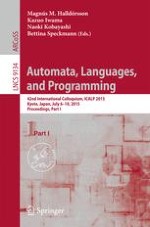2015 | OriginalPaper | Buchkapitel
Solving Linear Programming with Constraints Unknown
verfasst von : Xiaohui Bei, Ning Chen, Shengyu Zhang
Erschienen in: Automata, Languages, and Programming
Verlag: Springer Berlin Heidelberg
Aktivieren Sie unsere intelligente Suche, um passende Fachinhalte oder Patente zu finden.
Wählen Sie Textabschnitte aus um mit Künstlicher Intelligenz passenden Patente zu finden. powered by
Markieren Sie Textabschnitte, um KI-gestützt weitere passende Inhalte zu finden. powered by
What is the value of input information in solving linear programming? The celebrated ellipsoid algorithm tells us that the full information of input constraints is not necessary; the algorithm works as long as there exists an oracle that, on a proposed candidate solution, returns a violation in the form of a separating hyperplane. Can linear programming still be efficiently solved if the returned violation is in other formats?
Motivated by some real-world scenarios, we study this question in a trial-and-error framework: there is an oracle that, upon a proposed solution, returns the
index
of a violated constraint (with the content of the constraint still hidden). When more than one constraint is violated, two variants in the model are investigated. (1) The oracle returns the index of a “most violated” constraint, measured by the Euclidean distance of the proposed solution and the half-spaces defined by the constraints. In this case, the LP can be efficiently solved (under a mild condition of non-degeneracy). (2) The oracle returns the index of an arbitrary (i.e., worst-case) violated constraint. In this case, we give an algorithm with running time exponential in the number of variables. We then show that the exponential dependence on
n
is unfortunately necessary even for the query complexity. These results put together shed light on the amount of information that one needs in order to solve a linear program efficiently.
The proofs of the results employ a variety of geometric techniques, including the weighted spherical Voronoi diagram and the furthest Voronoi diagram.
